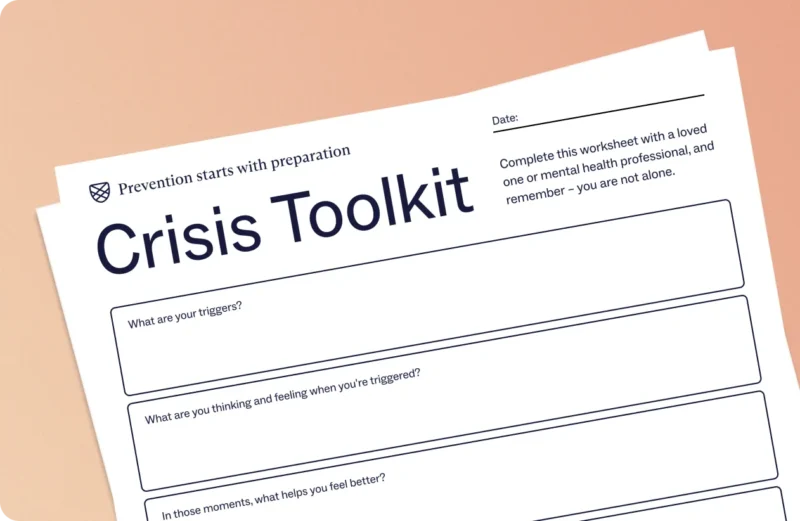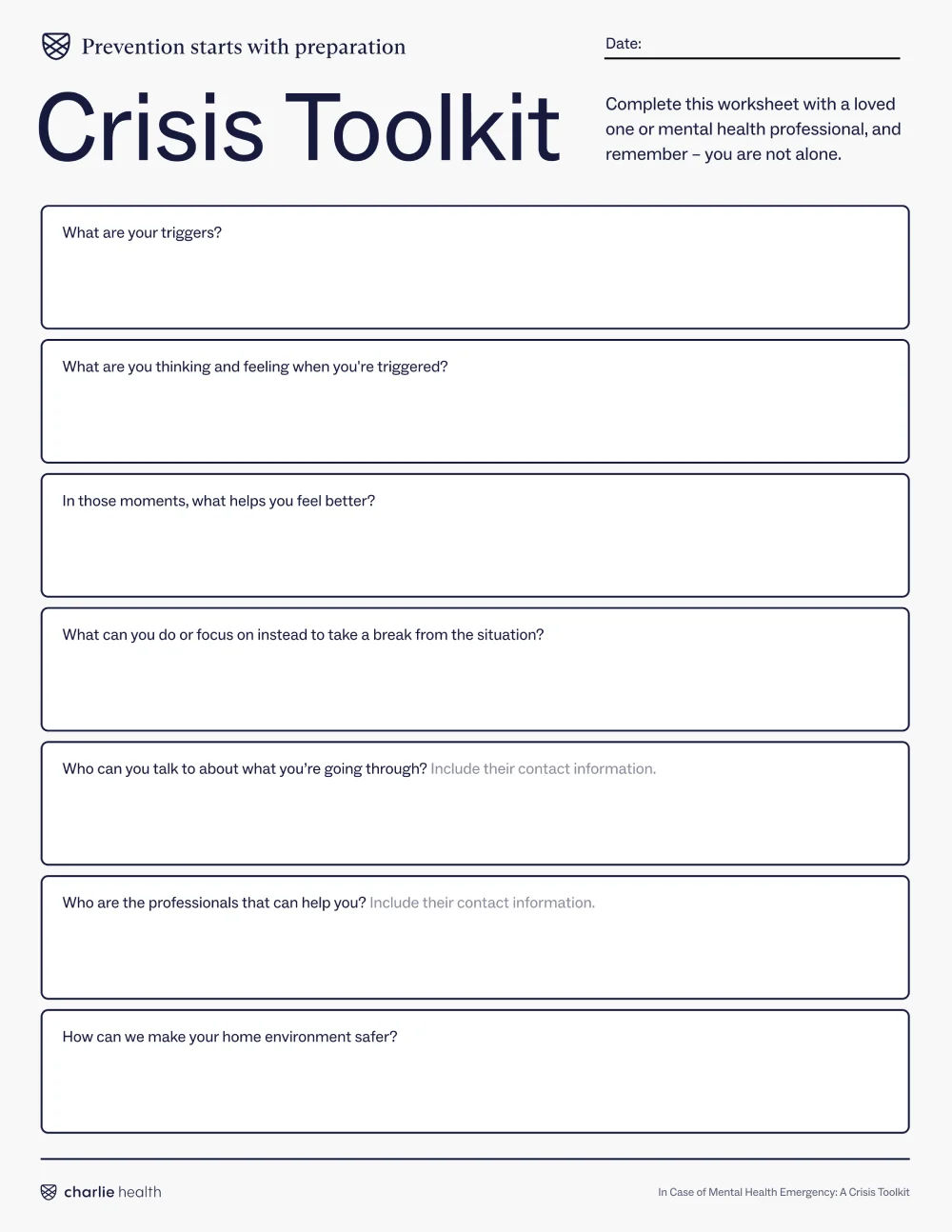In Case of Mental Health Emergency: A Crisis Toolkit

Prevention starts with preparation
A mental health crisis can happen to anyone. Create your Crisis Toolkit today to empower yourself or a loved one with resources and support.
How to start the conversation

Find a safe space
Whether it’s your kitchen table, a local coffee shop, or a favorite park, find a place where it feels safe to open up.
Ease into it
Be genuinely curious about what’s going on in your loved one’s life. This should be an authentic conversation, not just a list of questions.
Keep an open mind
Conversations around mental health aren’t always easy, and that’s okay. Remain calm and non-judgmental. When in doubt, ask questions instead of offering advice or making statements.
Build them up
Reassure them that they’re safe and loved. Remind them that even if they feel alone, it doesn’t mean they are alone.
Remember: healing is a journey
The Crisis Toolkit is designed to change and develop over time. Normalize the conversation by checking in regularly.
FAQs
What is the Crisis Toolkit?
The Crisis Toolkit is an easy-to-use set of questions designed to help families navigate mental health emergencies together. Think of it like a fire escape plan for your home. The more prepared you are to handle a mental health emergency, the easier it will be to remain calm in a moment of crisis.
Who can use the Crisis Toolkit?
Anyone can create the Crisis Toolkit. Our Crisis Toolkit, however, is designed specifically for young people and their loved ones to discuss and complete together.
What should I include in my Crisis Toolkit?
You should include specific mental health triggers, coping skills that have worked in the past, and the names and contact information of the people in your support network (friends, family members, a primary care provider, mental health professionals, etc.) There are no right or wrong answers, so try to be as open and honest as possible.
How do I use the Crisis Tollkit?
First, download and print the Crisis Toolkit. If you don’t have a printer, you can use the questions in the Toolkit and answer them in a notebook!
What is a mental health crisis?
A mental health crisis refers to a situation where a person’s mental well-being is severely compromised, and they are experiencing significant distress or instability. It is often characterized by a sudden escalation of symptoms or an inability to cope effectively with a specific stressor or emotional state. Some common examples of a mental health crisis include:
- Intense feelings of hopelessness, despair, or suicidal thoughts.
- Severe anxiety or panic attacks.
- Extreme mood swings or emotional instability.
- Inability to take care of oneself or perform daily activities.
What is a mental health emergency?
A mental health emergency is a situation where there is an imminent risk of harm to oneself or others due to a severe mental health condition. It involves an immediate threat to life, safety, or well-being. Some examples of a mental health emergency include:
- Active or imminent suicidal behavior, such as a suicide attempt or expressing a clear plan and intent to end one’s life.
- Extreme aggression or violence toward oneself or others.
- Loss of consciousness or significant impairment in functioning due to mental health symptoms.
What if I want to update my Crisis Toolkit?
You should aim to review your Crisis Toolkit every six months. However, if you discover a new coping skill, connect with a new mental health provider, or want to include any other information not in the original version, make sure to update the responses
How do I find other prevention resources?
- The National Suicide and Crisis Lifeline provides free, confidential 24/7 support to individuals in crisis or those concerned about someone at risk. You can call or text them at 988, or chat with a counselor online at 988lifeline.org/chat.
- Use the SAMHSA Helpline, which provides 24-hour free and confidential help with treatment referrals and information about mental health and drug or alcohol use disorders, prevention, and recovery in English and Spanish.
-
- Call: 1-800-662-4357
- Text your ZIP code to: 435748
- Visit SAMHSA’s National Helpline website: https://www.samhsa.gov/find-help/national-helpline
- The Trevor Project is a leading organization focused on suicide prevention and crisis intervention for LGBTQIA+ youth with free 24/7 support through their helpline, online chat, and text messaging service. To reach the Trevor Project, call 1-866-488-7386, chat with a counselor at thetrevorproject.org/get-help, or text “START” to 678678.
- IMAlive is an online crisis network that offers free, confidential chat support 24/7. Trained volunteers provide emotional support, crisis intervention, and resources. Visit the IMAlive website at www.imalive.org to chat with a crisis responder.
- Suicide.org is a comprehensive resource that provides information on suicide prevention, crisis helplines, and local resources worldwide. It offers a database of helpline numbers and resources organized by country. Visit www.suicide.org for more information.
- Charlie Health’s virtual Intensive Outpatient Program (IOP) is an evidence-based and personalized treatment option for teens and young adults struggling with serious mental health issues, including suicidal ideation. You can learn more about our program and connect with our Care Team 24/7 at (866) 491-5196, or start by filling out our online form to determine whether IOP is the right fit for you or your loved one.
- Remember, if you or someone you know is in immediate danger or experiencing a life-threatening emergency, please call 911.
Resources

How to Talk to Your Teen About Mental Health Challenges: 4 Easy Steps
Charlie Health Editorial Team

Comprehensive treatment from home.
92% of Charlie Health clients and their families would recommend Charlie Health

